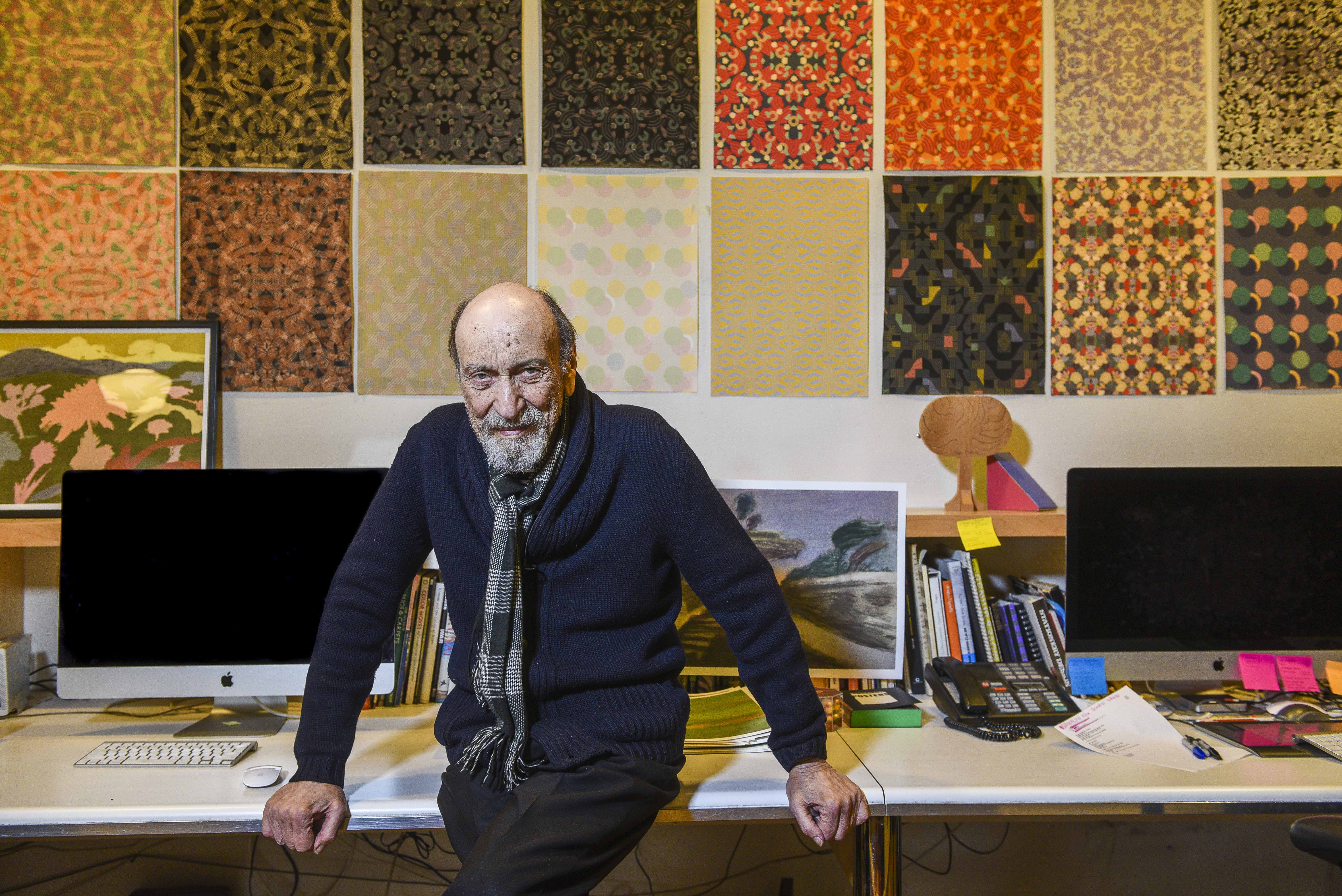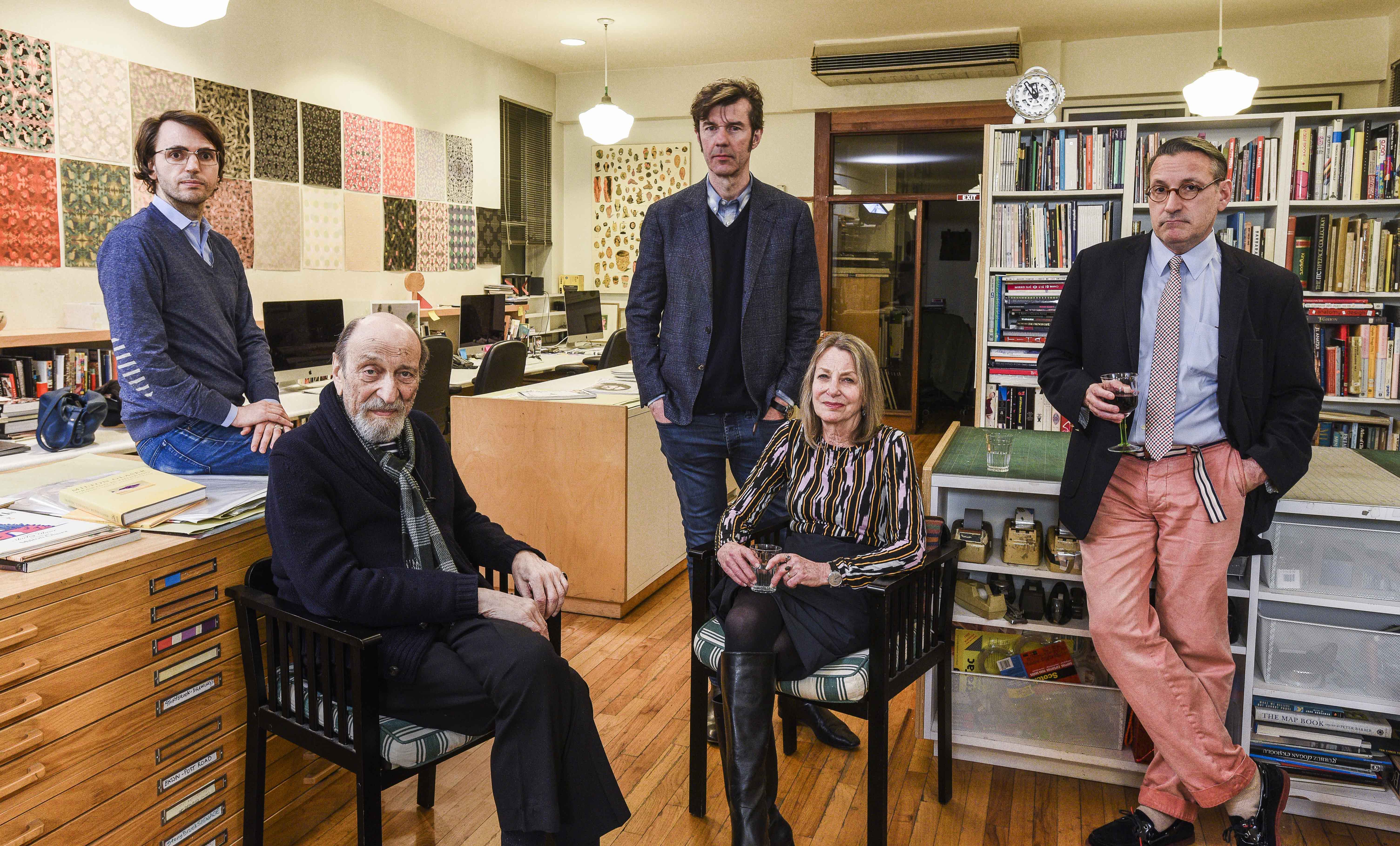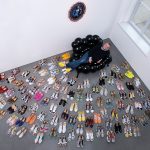
Does a designer have to be a good businessman? Is it sometimes more difficult to convince a client that this is the right idea than to actually create it?
Scher: Sometimes.
Kidd: Part of the reason why I am still part of the staff at Knopf office (publisher Alfred A. Knopf/Penguin Random House, editor’s note) is because it ensures that I don’t have to be a good businessman. It doesn’t matter, I get a salary. I don’t really have what these guys would call client meetings. I have an offer that I have to please. But I never pitch anything. The jacket is the pitch. You either like it and it’s working for your piece of writing, or it’s not. I can’t “sell them on it.” It has to convince them on its own.
Sagmeister: Before I opened the studio, ages ago, I used to work for Tibor Kalman (a US graphic designer and editor-in-chief of Colors Magazine. Kalman passed away in 1999, editor’s note), and he was a fantastic salesman. It was a joy to see it, and I was convinced that this was one of the main reasons why his studio was doing such good work.
Scher: Absolutely. I think all of us know what it means to have a changeable clientele. I wouldn’t call myself a good salesperson, but I am a really good teacher. I teach my clients how to see, almost like lessons, I show them things; I often treat them like students whose eyes I am attempting to open. That’s the way I do it, because I can pull that off. And it works. I can show them why different typefaces look different, I can show them how people recognize something.
Wilker: I remember we had a discussion once about how you go away for a certain amount of time, and then you come back to the client and you present them one idea. Or you don’t go back for a long time but you keep in touch with the client and really involve them. And when we were talking about it, I have just discovered the new way of doing it, of involving the client much more. I embrace the client, taking them on the trip.
Scher: Have you ever worked with an architect who told you what to do, and when you didn’t like it, get mad at you? I would hate to be in a position like that. I don’t want to do that to my clients. I would rather have an honest relationship with them. But everybody’s style is different.
Kidd: And you always have to start over, don’t you think?
Scher: Yes, always.
Kidd: And this “Oh my God, I just love your work!”–and then you do something, and they don’t like it! You have got to start over every time. Because it doesn’t matter what reputation you have. I am in a niche world, in the publishing world, so some of the authors know who I am. But if I don’t deliver what they want, they reject it. It doesn’t matter who I am. It matters what I do.
Sagmeister: After all, this is the author that wrote the book. This is their baby! And the same is true if you do a brand for somebody’s company. This is really, really close to their heart. It’s like you are picking out the clothes for their babies.
Scher: That’s right. You are making a whole group of people wear the same outfit. You are telling what outfit to wear. I mean, that’s really arrogant.
Glaser: Every relationship is different. Every person is different. It’s blind luck when you find somebody whose character is aligned with your own, that you will be in general agreement with. Otherwise you will be prepared for no logical premise for an agreement at all. Except for this circumstance when you present something, and he happens to like blue and you like blue. It’s a series of uncontrolled accidents. But I have to say, I can’t work for anybody I don’t like. And I make that decision in a fraction of a second, when they come through the door. How terrible to be so unprofessional! On the other hand, I can’t help myself. If I like them, I really want to do something extraordinary, if I don’t like them, I don’t start.
How do creative people like you deal with the fact that the president of the USA is Donald Trump?
Glaser: I don’t know what the word “creative” means. We are professionals. The creative part comes when people who don’t know exactly what they are doing hope they will stumble into something. That is not a very good product to offer to a client. There is so much mischief about the word “creative.” The whole methodology of creativity and ramifications of creativity are basically a way of people separating themselves from others for a position in the field that enables them to get more and better-paying work. When people use that word, I always get very jumpy.
I know that where my weekend house is, there are a lot of people who support Donald Trump. I see them and I know that they hate me. They are this other side of America. – Paula Scher
Then let me be more precise. America is divided. Trump’s fans, 30-35% of the population, totally ignore the truth. And then there is the other America. How does this reality affect your life and work here?
Scher: Here’s what’s really crazy, at least for me: I don’t work with or know anybody who supports Donald Trump. Some of my experiences with clients are totally bonding in the hatred. There is this sort of forged relationship that happens immediately. And I know that where my weekend house is, there is a whole sea of people who support Donald Trump. They live up there, they are blue-collar workers, they are poor. And I see them and I know that they hate me when I go into Staples and buy things, because they are this other side of America. This is the sort of thing that makes me nervous as a designer, because our job is actually to communicate to these broad audiences.
Glaser: You could easily say that Trump is the most creative president we have ever had. The one who basically understands how to disrupt the expectation in a way that no one else can imagine. Every day you wake up and think: “What could he have done today?” He will never have done anything that correlates with your idea of what he should have done. He has an imagination that is probably as fluent as Picasso’s.
Kidd: I don’t know if that’s a good comparison, Picasso and Trump.
Scher: He is a media genius though. Because he distracts.
Glaser: You would also have to call him a designer. And you would have to call him creative. You would have to use language that doesn’t seem to make sense at first, when applied to him. But ultimately you realize this is an unprecedented man who has learned all about design, motivation, advertising and show-business.
Scher: And the Electoral College! Because he is succeeding with 38%. You are not supposed to succeed with 38%, you are supposed to succeed with 51%! He is succeeding with the minority. Whoever was a successful president hovering between 41 and 38%? Not in my lifetime! I’m sorry, I go crazy when this subject comes up.
Kidd: But don’t you also think that a really great designer needs to have a sense of responsibility? And wow, he has none!
Glaser: Well, no one ever said that a designer had to have a sense of responsibility, because great design in history didn’t from time to time. The thing about Trump as a designer is that he figured out all this seemingly unrelated factors and unrelated people and unrelated events and so on, and used them to his advantage. Can you imagine a man as oppressive as he is managing to control the entire world? Which is what he is doing.
Scher: I am normally not a big friend of calling every profession a “designer,” but in Trump’s case, he definitely calls himself a brander. He sees his entities as branding exercises. He is definitely at home in that world and has been incredibly successful in it. Actually today, when I walked here after a difficult day at the studio, I felt a bit sorry for myself and saw the Daily News lying around. And somehow I realized that I can’t really imagine what kind of pressure this guy is under. The amount of shit that is happening in his life on a daily basis…
Kidd: But do you think he feels that though?
Scher: Oh, I do.
Okay, let’s wrap this up with a positive question. What inspires you?
Wilker: I think inspiration is hard work. I need time! If I didn’t have time, I would be a horrible designer.
Sagmeister: Same here. Those acts of genius, they are very few and very far between. It’s very rare that you just strike it lucky in a client meeting and things just happen. Normally the process is a pain in the ass, it’s really hard work.











